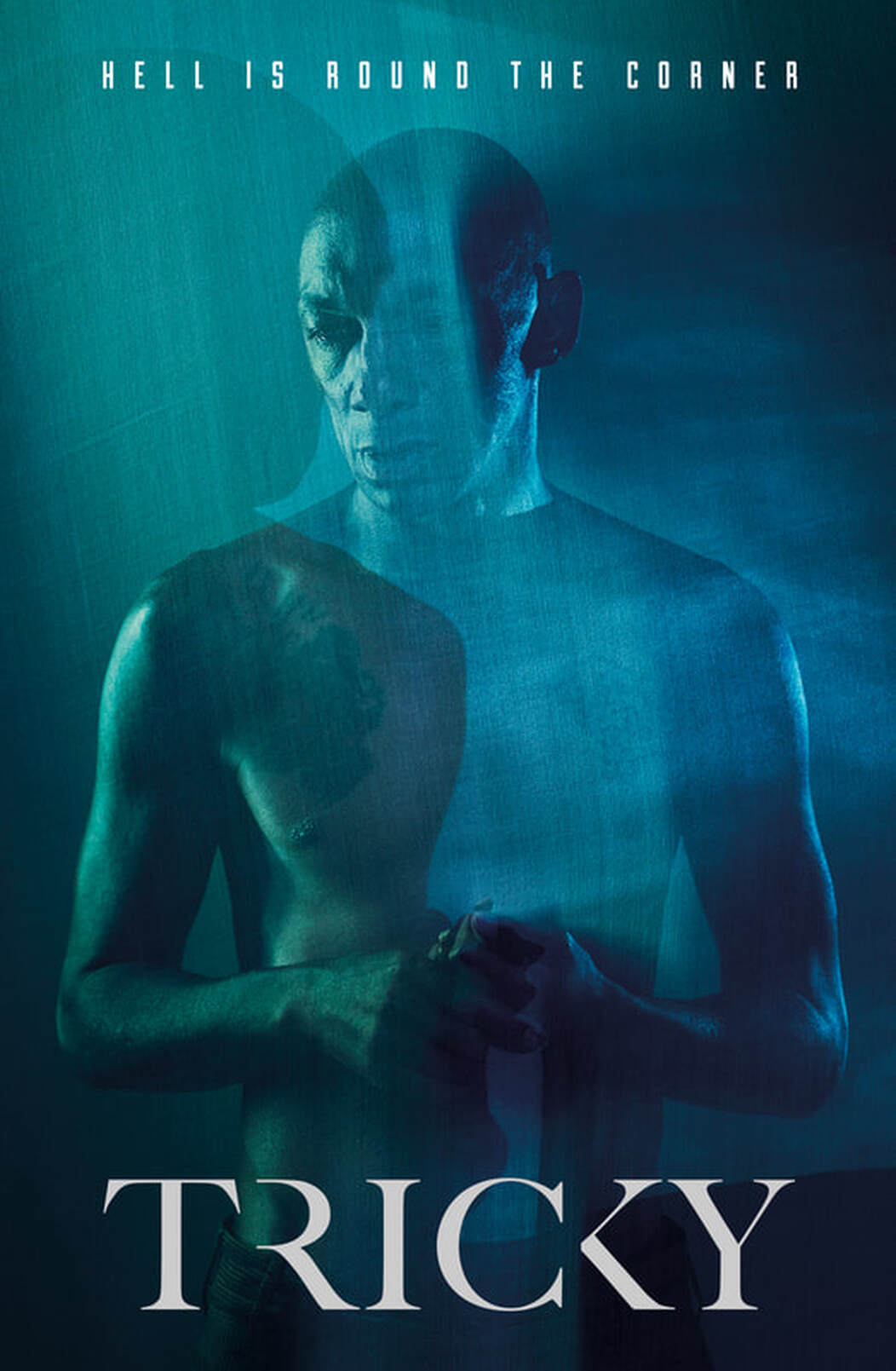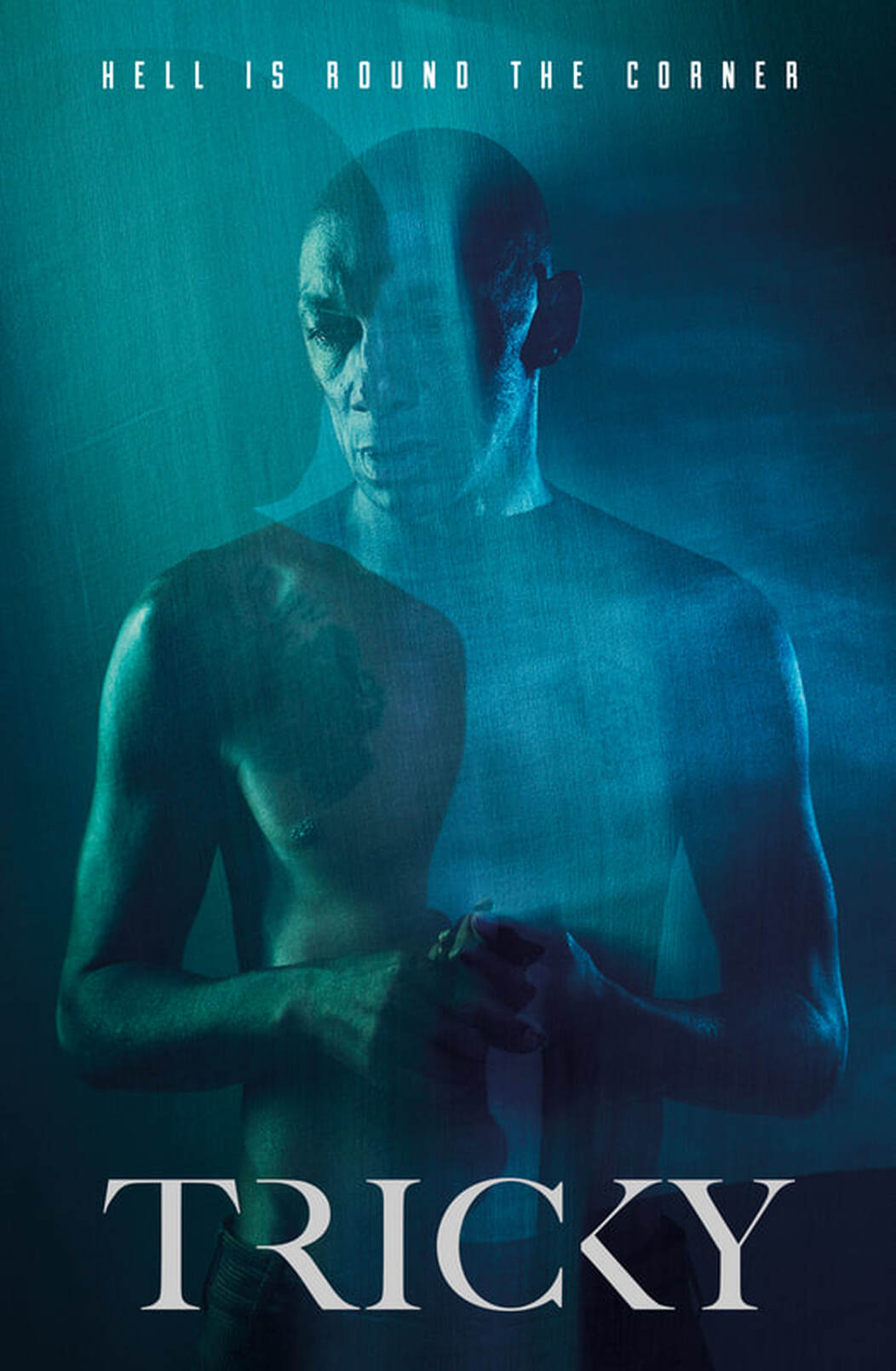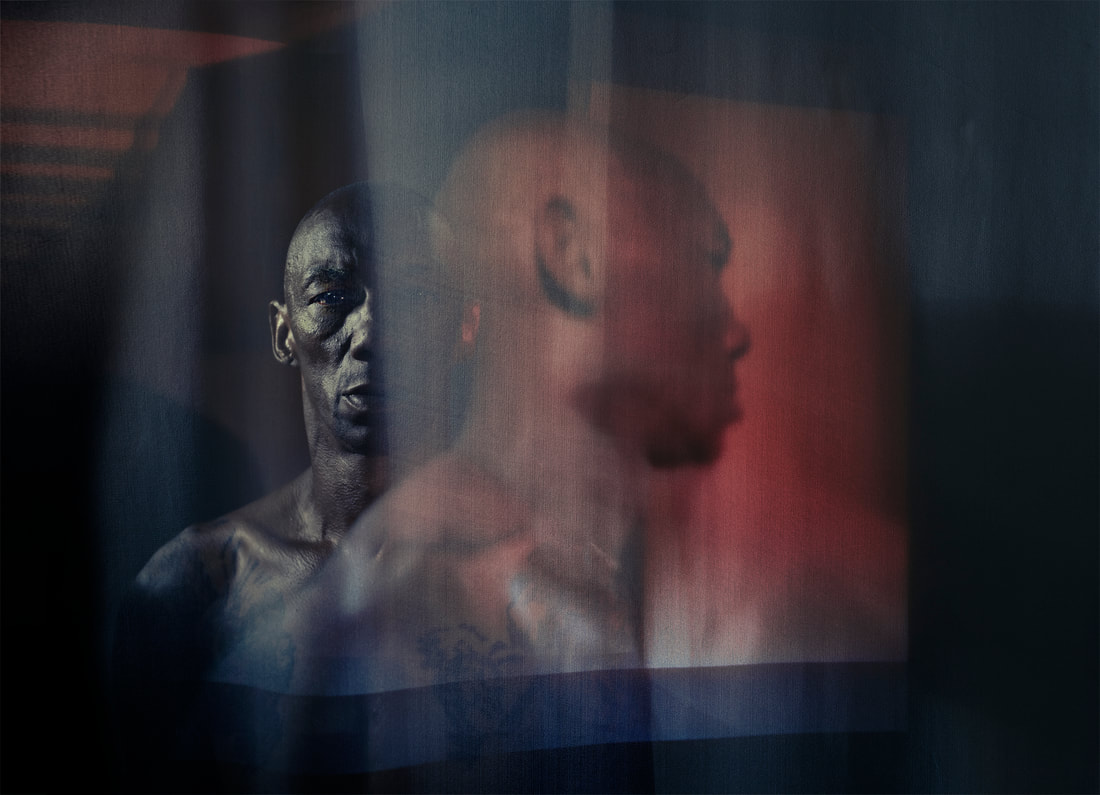Tricky
Tricky is one of the legends of the 1990s British music scene, pioneer in experimentations and in breaking down boundaries. He is back with a new EP baptised '20,20', out on 6 March 2020. ‘Lonely Dancer’, recorded with the female singer Anika, who collaborated with Geoff Barrow of Portishead’s fame in Bristol in 2010, is the first song to be released.
Melissa Chemam, renowned journalist & author of the best selling 'Massive Attack Out Of The Comfort Zone', met with Tricky a few weeks ago in his hometown of Bristol for the release of his highly acclaimed autobiography : 'Hell Is Around the Corner'. Read their incredibly enlightening conversation below. Best pp
Tricky
talks to
Melissa Chemam

‘How the hell did I get where I am?’ This question repeatedly comes back in this book retelling Adrian Thaws’ life, more known under his nickname: Tricky. He’s one of the rappers/producers who changed the sound of British music in the mid-1990s, along with his mates from Bristol, Massive Attack, Smith & Mighty, Roni Size, Alpha and Portishead. Since his first album, Maxinquaye, nominated for a Mercury Prize in 1995, he has released 12 others LP, as set up his own label, False Idols, and put out countless EPs.
The latest is due out in early March, and will be followed by a European tour in the spring, a great occasion to look back at Tricky’s amazing journey, representative on the UK’s brilliant diversity.
His recent biography is a thrilling look at his troubled youth in an impoverished area of Bristol, Knowle West, at his incredible rise to fame, and the making of his ever-evolving groundbreaking sound. After writing a book about the Bristol scene, Out of the Comfort Zone, released in March 2019, for which I met Tricky in Paris twice, I sat with him again, this time in his hometown the day before the book release. He was then finishing the EP coming out next week.
What sparked the desire to write your autobiography?
Somebody asked me if I wanted to do a biography and I said yes. I gave an interview to the co-author and he transcribed it. I didn’t even read it once finished! It’s weird to read about your own life…
Reading through this text, it’s obvious we recognise your voice, your drive, your personality… Did you feel you feel like sharing more about yourself with ypur fans or that you had to set some records straight?
No, nothing like that, there was no big concept behind doing this book. I was not trying to look back on my life. I didn’t think of the process; I was asked to do it and said yes, it’s as simple as that.
Everyone states that you had an incredible life… But you don’t see it this way, how so?
People tell me all the time that I had an outstanding life and a difficult childhood, but to me it was all very normal. I had a happy childhood. I loved my family; I had a good time in Knowle West, South Bristol, where I grew up. I lived with my grandmother and on the other side of the road lived her own mother. Not everybody gets to know their own great-grandmother! A social worker once said to me that, to her views, I had an ‘unstable’ childhood, losing my mum so young, living with my aunt then my grandma, etc. But to me it was totally normal.
Wasn’t it also abnormally violent?
Violence was also normal to me. Because we were a poor neighbourhood and tough times in though places make tough people. I was never a violent person myself, but I lived around tough men and women. Most of my uncles were in prison regularly. It was simply a low-income area.
Did music save your life?
I went into music for fun, it was never a business for me, or a plan. It was always a relaxing thing for me, without any pressure. I never felt I had to have success; I just did. I never felt the need to go on big tour and to headline festivals. My Knowle West vide again, I just wanted to do things my own way. I’m not a criminal socially, but I am mentally, in a way.
Some of the most fascinating elements of your productions are your collaborations, with Massive Attack, Martina Topley-Bird, PJ Harvey, Björk, Alanis Morissette, etc. Do you prefer working with others?
I love working with other people, yes. Sometimes comes somebody you meet and a few days later you hear them singing your words, that’s beautiful. Going to the studio with another artist is always interesting. Most of the time for me everything goes really fast. I meet someone I want to work with and invite them in the studio. I like that feeling of being uncomfortable there because you hardly know each other, there is a nervous energy. It can work or not but that’s the challenge. Creativity can come from that confrontation.
The latest is due out in early March, and will be followed by a European tour in the spring, a great occasion to look back at Tricky’s amazing journey, representative on the UK’s brilliant diversity.
His recent biography is a thrilling look at his troubled youth in an impoverished area of Bristol, Knowle West, at his incredible rise to fame, and the making of his ever-evolving groundbreaking sound. After writing a book about the Bristol scene, Out of the Comfort Zone, released in March 2019, for which I met Tricky in Paris twice, I sat with him again, this time in his hometown the day before the book release. He was then finishing the EP coming out next week.
What sparked the desire to write your autobiography?
Somebody asked me if I wanted to do a biography and I said yes. I gave an interview to the co-author and he transcribed it. I didn’t even read it once finished! It’s weird to read about your own life…
Reading through this text, it’s obvious we recognise your voice, your drive, your personality… Did you feel you feel like sharing more about yourself with ypur fans or that you had to set some records straight?
No, nothing like that, there was no big concept behind doing this book. I was not trying to look back on my life. I didn’t think of the process; I was asked to do it and said yes, it’s as simple as that.
Everyone states that you had an incredible life… But you don’t see it this way, how so?
People tell me all the time that I had an outstanding life and a difficult childhood, but to me it was all very normal. I had a happy childhood. I loved my family; I had a good time in Knowle West, South Bristol, where I grew up. I lived with my grandmother and on the other side of the road lived her own mother. Not everybody gets to know their own great-grandmother! A social worker once said to me that, to her views, I had an ‘unstable’ childhood, losing my mum so young, living with my aunt then my grandma, etc. But to me it was totally normal.
Wasn’t it also abnormally violent?
Violence was also normal to me. Because we were a poor neighbourhood and tough times in though places make tough people. I was never a violent person myself, but I lived around tough men and women. Most of my uncles were in prison regularly. It was simply a low-income area.
Did music save your life?
I went into music for fun, it was never a business for me, or a plan. It was always a relaxing thing for me, without any pressure. I never felt I had to have success; I just did. I never felt the need to go on big tour and to headline festivals. My Knowle West vide again, I just wanted to do things my own way. I’m not a criminal socially, but I am mentally, in a way.
Some of the most fascinating elements of your productions are your collaborations, with Massive Attack, Martina Topley-Bird, PJ Harvey, Björk, Alanis Morissette, etc. Do you prefer working with others?
I love working with other people, yes. Sometimes comes somebody you meet and a few days later you hear them singing your words, that’s beautiful. Going to the studio with another artist is always interesting. Most of the time for me everything goes really fast. I meet someone I want to work with and invite them in the studio. I like that feeling of being uncomfortable there because you hardly know each other, there is a nervous energy. It can work or not but that’s the challenge. Creativity can come from that confrontation.
"What’s next for you musically?
"A new album! It doesn’t have a name yet but should come out in September 2020. There will be a couple of other EPs before then, and some release for my label, False Idols, I love releasing other artists."

You were discovered first on Massive Attack’s first album, Blue Lines, how do you see this experience 30 years later?
The first track I did with them was ‘Daydreaming’. I was so young at the time, I had no clue of how to release a track alone. And D (3D – aka Robert Del Naja) was my mate; we were always together in the clubs, in the same underground scene, from the Wild Bunch years. I was not at all interested in keeping a track for myself. I still hear people telling me how much they love it.
Then you worked on their second album, Protection, before going solo, and years later you worked with 3D again; he wrote ‘Take It There’ to sing with you and contacted you, did you accept right away after all these years?
I did, and he came to Paris where I lived in 2011. He said that the song had my vibe, that it’d be great to have me on it. But then he worked on it again and again and it only came out something like five years later!
Your music is a constant search for Maxine Quaye, your mother who died when you were 4 years old. In the book, you say that hadn’t she been taken away from you, you would never have become who you are… does it still feel true?
All my albums are a search for her. Most of my lyrics are from her, I believe. It’s a woman’s writing. She was writing poetry when she was young but she would never have been published at the time. So I did it for her through my music and my words. Sometimes I feel like it’s almost like she died for me…
The first track I did with them was ‘Daydreaming’. I was so young at the time, I had no clue of how to release a track alone. And D (3D – aka Robert Del Naja) was my mate; we were always together in the clubs, in the same underground scene, from the Wild Bunch years. I was not at all interested in keeping a track for myself. I still hear people telling me how much they love it.
Then you worked on their second album, Protection, before going solo, and years later you worked with 3D again; he wrote ‘Take It There’ to sing with you and contacted you, did you accept right away after all these years?
I did, and he came to Paris where I lived in 2011. He said that the song had my vibe, that it’d be great to have me on it. But then he worked on it again and again and it only came out something like five years later!
Your music is a constant search for Maxine Quaye, your mother who died when you were 4 years old. In the book, you say that hadn’t she been taken away from you, you would never have become who you are… does it still feel true?
All my albums are a search for her. Most of my lyrics are from her, I believe. It’s a woman’s writing. She was writing poetry when she was young but she would never have been published at the time. So I did it for her through my music and my words. Sometimes I feel like it’s almost like she died for me…
What’s next for you musically?
A new album! It doesn’t have a name yet but should come out in September 2020. There will be a couple of other EPs before then, and some release for my label, False Idols, I love releasing other artists.
You’ve travelled the world, lived in a lot of places, in New York, LA, Paris, Moscow, Berlin, what does Bristol represent to you?
I used to find it hard to come back but now I really like it. I’m spending Christmas here for instance, and I really feel it’s my city. I see family, and friends, I go to the same pubs as I was young and sometimes I run into guys I used to see there 30 years ago.
You also changed the city, you and Massive Attack, you open the door to so much possibility in the music and art scene, are you aware of it?
With music, yes probably, but it’s time to forget it! We need something new. Because of that nostalgia, younger artists don’t get played enough. Like Kahn and Young Echo, these artists are creating a new sound. They need to get recognition; we need to move on!
Melissa Chemam
About Melissa Chemam

Melissa Chemam is a freelance journalist, associate lecturer in journalism at UWE Bristol and author of the book Massive Attack - Out of the Comfort Zone (2019).
She has reported on migrations issues in East/Central Africa and Western Europe for the BBC World Service and other international broadcasters for many years.
We met through her book really, I arranged a phone interview with her because the subject looked amazing, a subject that has never really been written about before. The interview turned into a lovely conversation leading to a friendship and I'm honoured to have her contributing to Phacemag. Best pp
She has reported on migrations issues in East/Central Africa and Western Europe for the BBC World Service and other international broadcasters for many years.
We met through her book really, I arranged a phone interview with her because the subject looked amazing, a subject that has never really been written about before. The interview turned into a lovely conversation leading to a friendship and I'm honoured to have her contributing to Phacemag. Best pp
share


